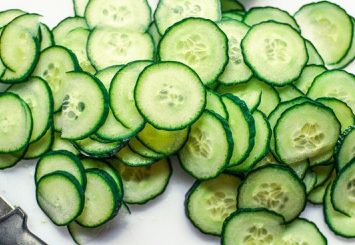Mediterranean Diet 101: A Meal Plan and Explanation

Losing weight with the Mediterranean diet is based on the traditional foods that people ate in countries such as Italy and Greece in the 1960s.
Researchers noted that compared to Dutch, these people were exceptionally healthy and had a low risk of many common diseases.
The Mediterranean diet blends healthy eating with the traditional flavors and cooking methods of the Mediterranean.
In this article we explain how Mediterranean food can help you lose weight and be good for your health!
Index
- What is the Mediterranean Diet?
- Avoid these unhealthy foods
- Why the Mediterranean Diet?
- What is the Mediterranean Diet?
- Better prevention and control of diabetes
- Lose weight with the Mediterranean diet
- Mediterranean food
- What can you drink?
- A Mediterranean menu for 1 week (Example)
- The benefits of the Mediterranean diet
- The Disadvantages of the Mediterranean Diet
- Cost
- Limitations can feel challenging
- Can be time consuming
- Conclusion
What is the Mediterranean Diet?
The Mediterranean diet is a way of healthy eating based on the traditional cuisine of countries bordering the Mediterranean Sea. While there is no single definition of the Mediterranean diet, it is typically rich in vegetables, fruits, whole grains, beans, nuts and seeds, and olive oil.
The most important of the Mediterranean diet are:
- Daily consumption of vegetables, fruits, whole grains and healthy fats
- Weekly intake of fish, poultry, beans and eggs
- Moderate portions of dairy products
- Limited red meat intake
Avoid these unhealthy foods
You should avoid these unhealthy foods and ingredients:
- Added sugars : Soda, candy, ice cream, table sugar, and many others.
- Refined Grains : White bread, pasta made from refined wheat, etc.
- Trans fats : Found in margarine and all kinds of processed foods.
- Refined oils: Soybean oil, canola oil, cottonseed oil and others.
- Processed meats: Processed sausages, hot dogs, etc.
- Highly processed foods: Anything labeled “low-fat” or “diet” if you know it’s made in a factory.
You should read food labels carefully if you want to avoid these unhealthy ingredients.
Why the Mediterranean Diet?
Interest in the Mediterranean diet began in the 1960s with the discovery that heart disease in Mediterranean countries, such as Greece and Italy, caused fewer deaths than in the US and Northern Europe. Subsequent studies found that the Mediterranean diet is associated with reduced risk factors for cardiovascular disease.
What is the Mediterranean Diet?
The Mediterranean diet is one of the healthy diet plans recommended by many consultants to promote health and prevent chronic diseases.
Better prevention and control of diabetes
Following the Mediterranean diet can help people with type 2 diabetes better control their blood sugar.
A review of 56 studies from 1978 to 2016, in which 4,937 patients with type 2 diabetes participated in the Mediterranean diet, compared to other diets, was able to reduce hemoglobin A1c levels by an average of up to 0.32%.
Hemoglobin A1c reflects your body’s blood sugar control over the past three months. While it may sound small, any reduction can be helpful for people with diabetes trying to control blood sugar levels.
Lose weight with the Mediterranean diet
It seems counter-intuitive that a diet that emphasizes high-calorie olive oil and nuts can aid weight loss. But these saturated fats — along with the many fiber-rich vegetables and fruits recommended — can help you feel full longer and help you lose weight.
Mediterranean food
Exactly what foods belong to the Mediterranean diet is different, partly because there is such variation between different countries.
The diet examined in most studies is high in healthy plant foods and relatively low in animal foods.
However, eating fish and seafood is recommended at least twice a week.
The Mediterranean lifestyle also includes exercising regularly, sharing meals with other people and enjoying life while losing weight in a healthy way .
The intention is that you base this diet on these healthy, unprocessed foods:
- Vegetables: Tomatoes, broccoli, kale, spinach, onions, cauliflower, carrots, Brussels sprouts, cucumbers.
- Fruits : Apples, bananas, oranges, pears, strawberries, grapes, dates, figs, melons, peaches.
- Nuts and seeds: Almonds, walnuts, macadamia nuts, hazelnuts, cashews, sunflower seeds, pumpkin seeds.
- Legumes: Beans, peas, lentils, legumes, peanuts, chickpeas, etc.
- Tubers: Potatoes, sweet potatoes, turnips, yams.
- Whole grains: Whole oats, brown rice, rye, barley, corn, buckwheat, whole wheat, whole wheat bread and pasta.
- Fish and seafood: Salmon, sardines, trout, tuna, mackerel, shrimp, oysters, clams, crab, mussels.
- Poultry: Chicken, duck, turkey.
- Eggs: Chicken, quail and duck eggs.
- Dairy: Cheese, yogurt, Greek yogurt.
- Herbs and Spices: Garlic, basil, mint, rosemary, sage, nutmeg, cinnamon, pepper.
- Healthy fats: Extra virgin olive oil, olives, avocados and avocado oil.
Unprocessed products and foods are the key to good health and are central to this diet.
What can you drink?
Water should be your go-to drink on a Mediterranean diet.
This diet also includes a small amount of red wine – about 1 glass a day.
Coffee and tea are also allowed, but you should avoid sugar-sweetened drinks and fruit juices if you want to lose weight.
A Mediterranean menu for 1 week (Example)
Below is a sample menu for a week of Mediterranean diet.
Feel free to adjust the portions and food choices to suit your own needs and preferences.
Monday
- Breakfast: Greek yogurt with strawberries and oatmeal.
- Lunch: Whole grain sandwich with vegetables.
- Dinner: A tuna salad, with olive oil. A piece of fruit for dessert.
Tuesday
- Breakfast: Oatmeal with raisins.
- Lunch: Leftover tuna salad from the night before.
- Dinner: Salad with tomatoes, olives and feta.
Wednesday
- Breakfast: Omelette with vegetables, tomatoes and onions. A piece of fruit.
- Lunch: Wholemeal sandwich, with cheese and fresh vegetables.
- Dinner: Mediterranean lasagna.
Thursday
- Breakfast: Yogurt with sliced fruit and nuts.
- Lunch: Leftover lasagna from the night before.
- Dinner: Roast salmon, served with brown rice and vegetables.
Friday
- Breakfast: Eggs and vegetables, fried in olive oil.
- Lunch: Greek yogurt with strawberries, oats and nuts.
- Dinner: Grilled lamb, with salad and baked potato.
Saturday
- Breakfast: Oatmeal with raisins, nuts and an apple.
- Lunch: Whole grain sandwich with vegetables.
- Dinner: whole-wheat Mediterranean pizza, topped with cheese, vegetables and olives.
Sunday
- Breakfast: Omelette with vegetables and olives.
- Lunch: Leftover pizza from the night before.
- Dinner: Grilled chicken, with vegetables and a potato. Fruit for dessert.
There is usually no need to count calories or track protein, fat and carbohydrates on the Mediterranean diet.
The benefits of the Mediterranean diet
The benefits of the Mediterranean diet are:
- Balanced, tasty food
- Promotes Heart Health
- Better prevention and management of diabetes
- Helps your mental health
- Helps lose weight
- Reduces inflammation
- Less chance of getting cancer
- Environmentally friendly(er)
Diets where you eat less beef and more grains and other plant products appear to be healthier for the planet. Producing meat emits a lot of CO2, so eating organic alternatives is not only good for weight loss but also for the planet!
The Disadvantages of the Mediterranean Diet
The disadvantages of the Mediterranean diet are:
- The food can be expensive
- Certain conditions may require additional guidance
- May be deficient in some nutrients
- No specific guidelines to follow
- Can be time consuming
For some people, there may be a few drawbacks to the Mediterranean diet. However, many of these drawbacks are surmountable.
Cost
There are no expensive products or special supplements to buy for the Mediterranean diet. Some people worry about the cost of some products, including fish, seeds, nuts, and olive oil.
For example, fresh seafood tends to be more expensive than other proteins.
Limitations can feel challenging
This diet recommends cutting back on red meat and added sugar consumption, which can be difficult for some people. Those who are used to the standard Dutch diet can regularly inadvertently ingest sugars.
Those following the Mediterranean diet are advised to eat sugars only on special occasions.
If you’re having trouble eating red meat less often, try this diet while consuming lean, unprocessed red meats like carpaccio and steak in smaller portions. Research suggests you’re doing it right for your heart health.
Can be time consuming
Shopping for items required by the Mediterranean diet and preparing meals will likely take longer than reheating ready-to-eat or fast food.
Processed products are discouraged in this diet, while balanced meals are made from whole ingredients.
Certainly, this change may require some adjustment for some people. But many people learn to love cooking and preparing meals for themselves or their families.
Plus, you can prepare large amounts of food ahead of time for later use as a meal.
Conclusion
Although there is no single defined Mediterranean diet, this way of eating is generally rich in healthy plant foods and relatively less in animal products, with the exception of fish and seafood.
You can find a lot of information about the Mediterranean diet on the internet and many good books have been written about it.
Try googling “ Mediterranean recipes ” and you’ll find a ton of great tips for delicious meals.
The Mediterranean diet is incredibly healthy and satisfying. If you choose to follow this trajectory and stick with it, you won’t be disappointed!











